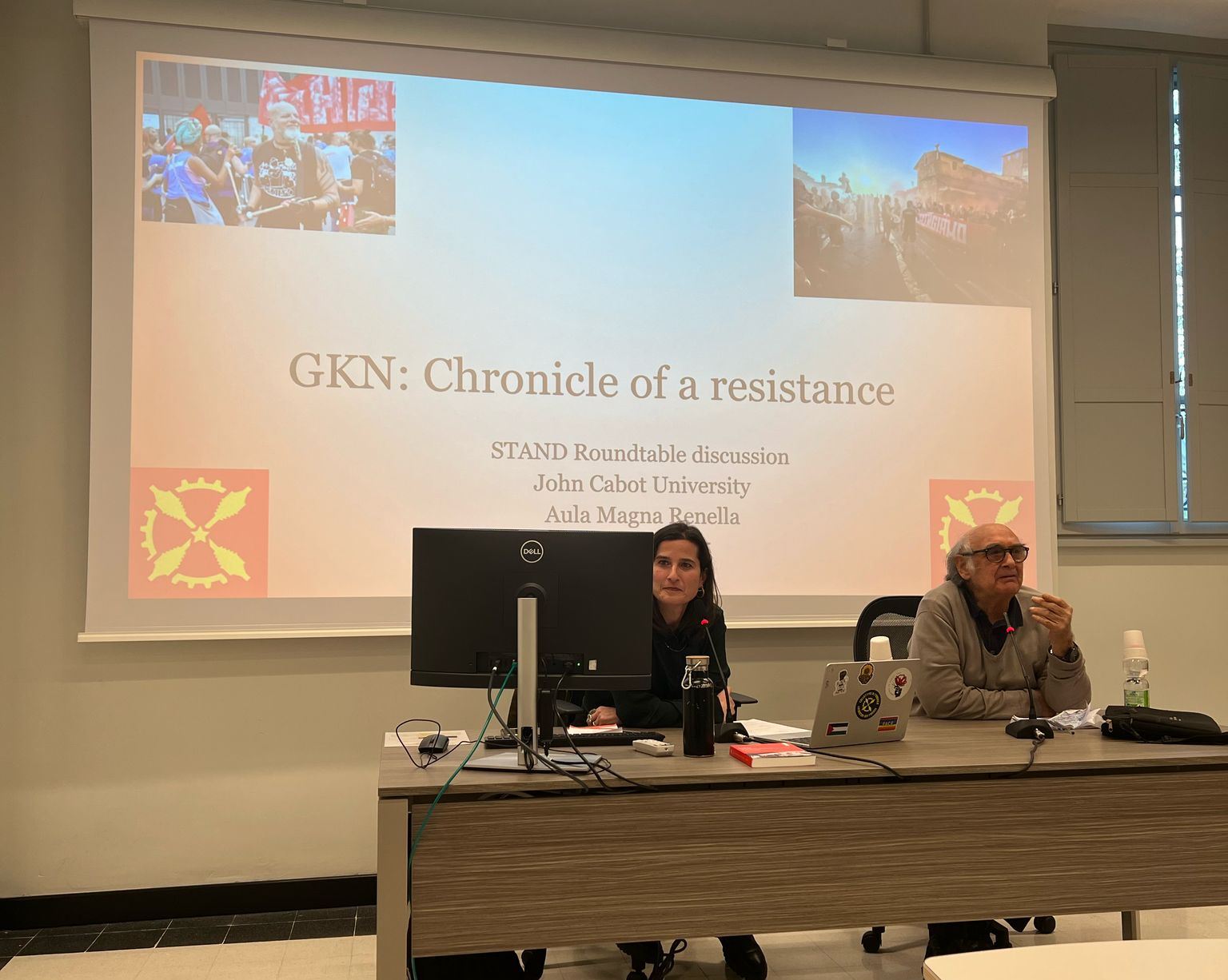Ex-GKN Workers’ Struggle in Italy: A Fight Beyond the Factory Walls
On April 1, JCU’s STAND club hosted a roundtable discussion on the ongoing resistance of ex-GKN steelworkers in Campi Bisenzio, just a few miles from downtown Florence. The discussion was led by Communications professor Silvia Giagnoni, who recently published a book on the subject, titled GKN. Cronistoria personale di un innamoramento collettivo (“GKN. A Personal Account of a Collective Love Story”). She was joined by Alessandro Portelli, former professor of literature at Sapienza University of Rome and oral history expert. The conversation highlighted how this labor struggle, sparked by mass layoffs in 2021, has grown into Italy’s longest-ever permanent assembly and a broader fight for dignity, community, and the redefinition of work.
A Struggle That Sparked a Movement

In 2018, when British investment firm Melrose acquired the historic GKN factory in Florence, it set the stage for a sudden confrontation. On July 9, 2021, 422 workers were notified by email that the factory would close within days. In response, they “occupied” the facility, challenging the system that prioritizes profit over people, while trying to re-industrialize the plant “from below:” the plan is to recover the factory on a cooperative basis with the production (and recycling) of solar panels, batteries, and cargo bikes.
Students at the roundtable reflected on the personal impact of such an abrupt upheaval. More than a fight to preserve jobs, the GKN struggle highlighted the need for stable, meaningful employment in Italy’s troubled automotive sector, a sector devastated by financial speculation and corporate as well as governmental negligence towards workers.

Despite the initial support of local institutions and their union affiliations, workers and their growing ally communities soon found themselves alone in their fight. An exposé by Irpimedia reported on “The Skye Project,” an internal GKN/Melrose memo referring to the plant’s permanent closure, which dated back to early 2020. Such a decision, despite the profitability of the Campi Bisenzio plant, further exemplifies the lack of accountability inherent in the financialization of industries. This is in contrast with the Italian Constitution, which embeds a strong principle of social responsibility in business. While promoting free enterprise, it requires that such activity serves society and respects fundamental human rights and the environment.
Layoff letters are currently being sent, and while the company is trying to avoid bankruptcy proceedings, workers remain in limbo. Professor Giagnoni further highlighted what the loss of the labor dispute (and the related factory premises) would mean—not just for GKN workers but for labor rights in general. If this resistance fails, it could set a dangerous precedent for workers everywhere in Italy.
The Power of Collective Action, Culture, and Joy
Beyond legal battles, the GKN resistance has fostered a cultural movement that integrates activism with daily life. Professor Giagnoni underlined how, in the words of the ex-GKN Factory Collective, “the story of the struggle is the same as the struggle,” emphasizing the need to create a joyful space of solidarity. Through shared meals, songs, and experiences, resistance has become integral to the daily lives of the GKN community of workers and allies.
Music has played a crucial role, with the protest song “Occupiamola” (“Let’s Occupy It”), adapted from a chant sung by Fiorentina soccer fans, transformed into an anthem that resonates beyond the factory. This act of collective expression underscores how resistance is not just about physical protest but also about shaping narratives and identities, as Professor Portelli showed with examples from his oral history research on the mineworkers in Harlan County, Kentucky. Social media has been another vital tool, with the “Collettivo di Fabbrica’s” Facebook page serving as a platform to counter mainstream media portrayals and misleading news coverage.
A Movement That Transcends Borders
Students drew comparisons with international labor struggles. Unlike in the U.S., where striking workers can be legally dismissed, Italian labor laws prevent employment termination due to strikes, Professor Portelli pointed out. In spite of these protections, though, the GKN workers face a system stacked against them.
The ex-GKN Factory Collective has formed alliances with labor and environmental groups in Germany, France, and Argentina. The discussion highlighted similar struggles worldwide, such as solidarity kitchens in Harlan County during a U.S. port strike and Italy’s “Polo della Cultura Operaia” (Working Class Culture Hub) project, which aims to turn part of the factory into a cultural space for workers and an important repository for labor movement archives.
The Fight Continues
As students left the discussion, they reflected on how the GKN struggle redefined their understanding of labor movements. This movement transcends the idea of a labor dispute. It is a declaration that dignity is non-negotiable and that communities can resist economic forces seeking to erase them.
The GKN struggle is a testament to the power of resistance fueled not only by hardship but by solidarity, music, and the shared joy of standing together. As the workers continue their fight, they remind the world that the future of labor is not just written in court rulings and corporate decisions—it is sung in chants, shared in meals, and carried forward by those who refuse to be silenced.
(Ximena Coster)





